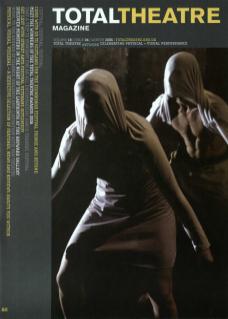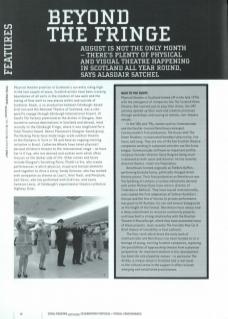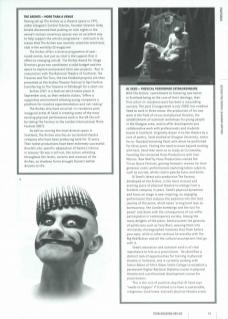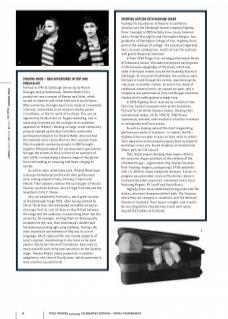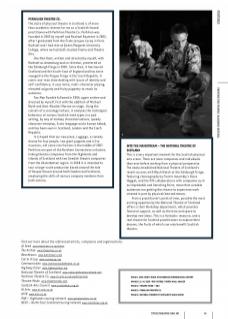Physical theatre practice in Scotland is currently riding high. In the last couple of years, Scottish artists have been crossing boundaries of all sorts in the creation of new work and the taking of that work to new places within and outside of Scotland. Roam, a co-production between Edinburgh-based Grid Iron and the National Theatre of Scotland, was a sitespecific voyage through Edinburgh International Airport. Al Seed’s The Factory premiered at the Arches in Glasgow, then toured to various destinations in Scotland and abroad, most recently to the Edinburgh Fringe, where it was longlisted for a Total Theatre Award. Benno Plassman’s Glasgow-based group The Working Party have made large-scale outdoor theatre at the Olympics in Turin in ’05 and have an ongoing training initiative in Brazil. Catherine Wheels have taken physical/ devised children’s theatre to the international stage – as have Cat In A Cup, who mix devised and written work which often focuses on the darker side of life. Other names and faces include Glasgow’s Vanishing Point; Plutôt La Vie, who create performances in which physical, visual and textual elements work together to drive a story; Sandy Grierson, who has worked with companies as diverse as Lazzi!, Ariel Teatr, and Periplum; Cait Davis, who has performed with Grid Iron; and Laura Cameron Lewis, of Edinburgh’s experimental theatre collective Highway Diner.
BACK TO THE ROOTS
Physical theatre in Scotland kicked off in the late 1970s with the emergence of companies like The Scottish Mime Theatre. Not content just to play their shows, the SMT actively opened up their work and creative processes through workshops and touring to remote, non-theatre venues.
In the ’80s and ’90s, names such as Communicado and the Gaulier-trained Benchtours emerged. Communicado’s first production, The House With The Green Shutters, incorporated daredevil physicality, live music and song. They are one of the few Scottish theatre companies working in a physical vein who use the Scots tongue. Communicado still have an important profile, company founder/director Gerry Mulgrew being much in demand as both actor and director: he has recently directed theatre-clown trio Peepolykus.
Benchtours formed originally as Théâtre Buffon, performing brutally funny, politically charged street theatre pieces. Their first production as Benchtours was The Splitting of Latham, a curious melodrama devised with writer Michael Duke (now artistic director of Tinderbox in Belfast). They have toured internationally, and created the first adaptation of Salman Rushdie’s Haroun and the Sea of Stories (a private performance was given to Mr Rushdie, his son and several bodyguards at the height of the Fatwa). Benchtours have always had a deep commitment to inclusive community projects, and have built a strong relationship with the Brunton Theatre in Musselburgh, where they have presented many of these projects, most recently The Invisible Man (or A Brief History of Invisibility in East Lothian).
The fiery torch which drove the early work of Communicado and Benchtours has been handed on to a barrage of young, exciting Scottish companies, exploring the possibilities of approaching theatre from a physical perspective. An important element in this development has been the role played by venues – in particular The Arches, a unique venue in Scotland and a real asset to the cultural scene in the support it offers to both emerging and established practitioners.
THE ARCHES – MORE THAN A VENUE
Having set up The Arches as a theatre space in 1991, under Glasgow’s Central Station, founder/director Andy Arnold discovered that putting on club nights in the venue’s various cavernous spaces was an excellent way to help support the artistic programme – and such is its status that The Arches was recently voted the tenth best club in the world by DJ magazine!
The Arches offers a diverse programme of year-round events, but just as vital is the support that it offers to emerging artists. The Arches Award For Stage Directors gives two candidates a solid budget and the space to explore and present their own projects. Run in conjunction with The National Theatre of Scotland, The Traverse and The Tron, the two finished projects are then presented at the Arches Theatre Festival in April before transferring to The Traverse in Edinburgh for a short run.
Arches LIVE! is a festival which takes place in September and, as their website states, ‘offers a supportive environment allowing young companies a platform for creative experimentation and risk-taking.’
The Arches also have an artist-in-residence post: inaugural artist Al Seed is creating some of the most exciting physical performance work in the UK (he will be taking The Factory to the London International Mime Festival 2007).
As well as running the most diverse space in Scotland, The Arches also has an acclaimed theatre company who have been producing work for 15 years. Their latest productions have been extremely successful: Arnold’s site-specific adaptation of Dante’s Inferno in January ’06 was a sell out, the action unfolding throughout the levels, caverns and recesses of the Arches, as shadowy forms brought Dante’s hellish dreams to life.
AL SEED – PHYSICAL PERFORMER EXTRAORDINAIRE
With The Arches’ commitment to fostering new talent in Scotland being at the core of their ideology, their first artist-in-residence post has been a resounding success. The post (inaugurated in July 2005) has enabled Seed to work in three areas: the production of his own work in the field of circus and physical theatre; the establishment of outreach workshops for young people in the Glasgow area; and to offer development and collaborative work with professionals and students based in Scotland. Originally drawn in to the theatre by a love of poetry, Seed studied at Glasgow University, where he co-founded Vanishing Point with whom he performed for three years. Feeling the need to move beyond working with text, Seed then went on to study at Circomedia, founding the renowned Hoax Productions with Ivan Marcos. Raw Beef by Hoax Productions visited the Circus Space Festival, gaining fantastic reviews for their generous comic performances exploring taboo subjects, such as suicide, whilst clad in peachy tutus and boots.
Al Seed’s latest solo production The Factory, developed at the Arches, is the most visceral and exciting piece of physical theatre to emerge from a Scottish company in years. Seed’s physical dynamism and focus on stage is awe-inspiring, an engaging performance that seduces the audience into the mad journey of the piece, which takes ‘a long hard look at bureaucracy, the London bombings and the lust for power’ and deals with the consequences of our wilful participation in contemporary society. Among the many delights of the piece, Seed assumes the gestures of politicians such as Tony Blair, weaving them into intricately choreographed moments that flash before your eyes, while in other sections he wrestles with The Big Red Button and all the cultural assumptions that go with it.
Seed’s education and outreach work is of vital importance to him as a practitioner. He identifies a distinct lack of opportunities for training in physical theatre in Scotland, and is currently working with Simon Abbot of Fife’s Adam Smith College to establish a permanent Higher National Diploma course in physical theatre and a professional development course for practitioners.
This is the sort of positive step that Al Seed says ‘needs to happen’ if Scotland is to have a sustainable, indigenous (and home-trained) physical theatre scene.
THEATRE MODO – NEW ADVENTURES IN TEXT AND PHYSICALITY
Formed in 1995 at Edinburgh University by Martin Danziger and Jo Underwood, Theatre Modo’s first production was a version of Romeo and Juliet, which toured to theatres and street festivals around France. After university, Danziger went on to study at Circomedia in Bristol, and worked as an outreach drama worker in Caithness, in the far north of Scotland. This was an opportunity he describes as ‘hugely rewarding, and in some ways knocked out the vestiges of an academic approach to theatre’. Working on large-scale community projects opened up the door to further community participation projects for Theatre Modo, who now had the talented actor Louise Allen on their creative team. Their Assipattle community project in 2003 brought together 450 participants for a processional spectacular through the streets of Wick in front of an audience of over 5,000, incorporating a diverse range of disciplines from stilt walking to canoeing and Gaelic singing to samba.
As well as their community work, Theatre Modo have a strong international profile with their professional work, having played in Italy, Germany, France and Poland. Their cabaret creation The Last Supper of Doctor Faustus, by Anita Sullivan, won a Fringe First and was the Guardian’s Critics’ Choice.
Ubu, an adaptation from Jarry, was a great success at the Edinburgh Fringe 2005, after having started its life at The Arches. Ubu demanded incredible resources of energy from its cast of three as they flitted between the stage and the audience, incorporating them into the action by, for example, inciting them to throw squishy tomatoes at the cast, Nick Underwood’s ukulele and harmonium providing agit-prop anthems. Perhaps the most impressive achievement of Ubu was its use of language, which captured the raw, bawdy vulgarity of Jarry’s original, transforming it into Scots at its most playful. Rarely has the word ‘Fannybaws’ been said as much and with such relish and conviction on the Scottish stage. Theatre Modo’s latest production is another adaptation, this time of Don Quixote, which premiered in Italy and then toured the UK.
STEPPING OUTSIDE WITH HIGHWAY DINER
Pushing the boundaries of theatre in a different direction are the Edinburgh-based company Highway Diner. Founded in 2003 by Kelly Crow, Laura Cameron Lewis, Kieran McLoughlin and Christopher Morgan, four graduates of Dartington College of Arts, Highway Diner work in the medium of collage: ‘We structure fragments like a musical composition, motifs of real life contrast with grand theatrical moments.’
In their 2004 Fringe First-winning performance Works of Temporary Solace, the audience became participants in the sensuous geography of the piece, which was sited in the back streets around the Assembly Rooms in Edinburgh. At one point blindfolded, the audience were led hand in hand through the streets, experiencing the city anew; in another instant, an entire city made of cardboard materialised in an unused car park, and a striptease was performed as Crow and Morgan shed their clothes whilst walking down a seedy lane.
In 2006 Highway Diner received an invitation from Turin City Council to present work at the Eccentrico Festival for the Winter Olympic Games. Marking their international debut, GO IN, STAY IN, TUNE IN was rapturously received, and resulted in a further invitation to collaborate with Turin artists.
As well as making some of the most invigorating performance works in Scotland – or indeed, the UK – Highway Diner are keen to pass on their skills to others. Their education and outreach projects have included DJ workshops and a site-based residency at Dunfermline Skate-park for Fife Council.
Their latest project Building Skyscrapers reflects the concerns, hopes and fears of the children of the information age – a generation drip-fed by constant, flish-flashing imagery, juxtaposing a 1950s aesthetic with J.G. Ballard-esque cyberpunk dystopia. A work-inprogress was presented in July at The Arches, where it incorporated video projection, movement and a score featuring Mogwai, Mr Scruff and Gavin Bryars.
Highway Diner have established strong links with The Arches, who have championed their work, The Traverse, where they are company in residence, and The National Theatre of Scotland. Their future is bright, and it won’t be very long before they become a well-kent name beyond the borders of Scotland.
PERHILION THEATRE CO.
The state of physical theatre in Scotland is of more than academic interest for me as a Scottish-based practitioner with Perhilion Theatre Co. Perhilion was founded in 2002 by myself and Rachael Rayment in 2002, after I graduated from the École Jacques Lecoq in Paris. Rachael and I had met at Queen Margaret University College, where we had both studied Drama and Theatre Arts.
One Man Rant, written and directed by myself, with Rachael as dramaturg and co-director, premiered at the Edinburgh Fringe in 2002. Since then, it has toured Scotland and the South-East of England and has twice voyaged to the Prague Fringe in the Czech Republic. A comic one-man show dealing with issues of identity and self-confidence, it uses mime, multi-character playing, elevated vulgarity and fruity puppetry to reach its audience.
Two Man Rumble followed in 2004, again written and directed by myself, first with the addition of Michael Blyth and then Alasdair Macrae on stage. Using the conceit of a sociology lecture, it analyses the archetypal behaviour of various Scottish male types in a pub setting, by way of monkey characterisations, speedy character interplay, Scots language and a human kebab, and has been seen in Scotland, London and the Czech Republic.
It is hoped that our new piece, Luggage, a comedy drama for four people, two giant puppets and a live musician, will come into fruition in the middle of 2007. Perhilion are part of the Northern Connections initiative, linking theatre companies from the Highlands and Islands of Scotland with two Swedish theatre companies from the Västerbotten region. In 2008 it is intended to tour a large-scale production based around the tale of Kaspar Hauser around both Sweden and Scotland, employing the skills of various company members from both nations.
INTO THE MAINSTREAM – THE NATIONAL THEATRE OF SCOTLAND
This is a very important moment for the Scottish physical arts scene. There are more companies and individuals than ever before working from a physical perspective. The newly established National Theatre of Scotland’s recent success with Black Watch at the Edinburgh Fringe, featuring choreography by Frantic Assembly’s Steve Hogget, and the NTS collaborations with companies such as Improbable and Vanishing Point, mean that sizeable audiences are getting the chance to experience work created in part by physical/devised means.
From a practitioner’s point of view, possibly the most exciting opportunity the National Theatre of Scotland offers is their Workshop department, which provides financial support, as well as the time and space to develop new ideas. This is a fantastic resource, and a real chance for Scottish practitioners to explore their dreams, the fruits of which can only benefit Scottish theatre.
Find out more about the referenced artists, companies and organisations:
Al Seed www.thearches.co.uk/artist
The Arches www.thearches.co.uk
Benchtours www.benchtours.com
Cat In A Cup www.catinacup.org
Communicado www.communicadotheatre.co.uk
Highway Diner www.highwaydiner.org
National Theatre of Scotland www.nationaltheatrescotland.com
Perhilion Theatre Co. www.hi-arts.co.uk/perhilion.htm
Theatre Modo www.theatremodo.com
Scottish Arts Council www.scottisharts.org.uk
Hi Arts www.hi-arts.co.uk
HITN www.hitn.co.uk
PAN – Highlands touring network www.panpromoters.co.uk
NEAT – North East Scotland touring network www.neatshows.org.uk
